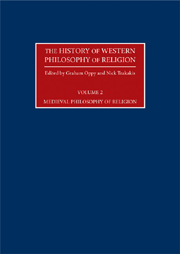Book contents
- Frontmatter
- Contents
- Editorial Introduction
- Contributors
- 1 Medieval Philosophy of Religion: An Introduction
- 2 Boethius
- 3 Johannes Scottus Eriugena
- 4 Al-Farabi
- 5 Avicenna (Ibn Sina)
- 6 Anselm of Canterbury
- 7 Al-Ghazali
- 8 Peter Abelard
- 9 Bernard of Clairvaux
- 10 Averroes (Ibn Rushd)
- 11 Moses Maimonides
- 12 Roger Bacon
- 13 Thomas Aquinas
- 14 John Duns Scotus
- 15 William Ockham
- 16 Gersonides
- 17 John Wyclif
- 18 Nicholas of Cusa
- 19 Erasmus of Rotterdam
- Chronology
- Bibliography
- Index
17 - John Wyclif
- Frontmatter
- Contents
- Editorial Introduction
- Contributors
- 1 Medieval Philosophy of Religion: An Introduction
- 2 Boethius
- 3 Johannes Scottus Eriugena
- 4 Al-Farabi
- 5 Avicenna (Ibn Sina)
- 6 Anselm of Canterbury
- 7 Al-Ghazali
- 8 Peter Abelard
- 9 Bernard of Clairvaux
- 10 Averroes (Ibn Rushd)
- 11 Moses Maimonides
- 12 Roger Bacon
- 13 Thomas Aquinas
- 14 John Duns Scotus
- 15 William Ockham
- 16 Gersonides
- 17 John Wyclif
- 18 Nicholas of Cusa
- 19 Erasmus of Rotterdam
- Chronology
- Bibliography
- Index
Summary
Few medieval thinkers have evoked the reactions that Wyclif has. His admirers, from late medieval Oxford and Prague to post-Reformation historians and Protestant apologists, wax enthusiastic about the ‘Evangelical Doctor’ or the ‘Morning Star of the Reformation’. On the other hand, his detractors, from his day into the present, revile him as heresiarch and apostate. Turning to his many extant works, one would expect dramatic prose, still smouldering with the whiff of the bonfire, from such a polarizing figure. After all, two distinct, widespread reform movements claim Wyclif's teachings as their inspiration. Lollardy beleagured the English establishment into the fifteenth century, and the Hussite movement ended in full-scale war in Czech-speaking lands. Instead, the reader finds dense argument and scholastic terminology, dizzying repetition and endless reference to Scripture. Wyclif's appeal, and his danger, lie not in his popular availability, but in his solid foundation in the scholastic tradition. He envisaged himself as continuing the tradition of Augustine, Anselm and Robert Grosseteste, and even championing the synthesis of Aqunias, in the face of Ockhamism's threat to theology's pre-eminence among the sciences. Wyclif was less an innovator or a reformer than a radical reactionary, a zealot hungry to cleanse the Church and its theology of the intellectual and political poisons that had built up by the fourteenth century. But his call for a royal divestment of ecclesiastical and especially papal power, the widespread availability of vernacular Scripture and his rejection of transubstantiation seem more consonant with Reformation theology than with scholasticism. While earlier scholars concluded that Wyclif ’s thought presaged Protestantism, our understanding of later scholasticism, particularly of Oxford in the early fourteenth century, allows us to understand his ideas as products of his age.
- Type
- Chapter
- Information
- The History of Western Philosophy of Religion , pp. 223 - 234Publisher: Acumen PublishingPrint publication year: 2009



